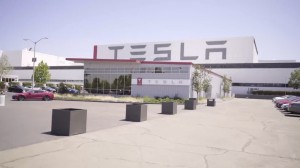
Tesla CEO Elon Musk needed to add a fourth line to the company's plant. He didn't have room inside so he built a tent.
Stung by the slow rollout of its critical Model 3, Tesla has pulled out all the stops to try to boost production, even setting up a fourth assembly line under a tent alongside its Fremont, California plant.
CEO Elon Musk has promised to have 5,000 Model 3 sedans rolling out of the Fremont factory each week by the end of June, something critical to achieve his other stated goals of having Tesla in the black, with a positive cashflow, during the second half of 2018. The “production hell” of the Model 3 launch resulted in record losses for Tesla during the first quarter of the year.
But there are growing doubts that Tesla will meet its production target. And that would raise new concerns about its finances – including the potential need to go back for more capital this year as the company’s cash reserves dwindle.
CEO Elon Musk has been sending out tweets hinting that Tesla is coming close to its goal. He has emphasized the steps the company is taking to get there, a mid-month tweet noting that Tesla “Needed another general assembly line to reach 5k/week Model 3 production. A new building was impossible, so we built a giant tent in 2 weeks.”
(Tesla batteries reigniting after being put out. Click Here for the story.)
But Tesla has also run into some new snags. News reports earlier this week suggested that battery supplier Panasonic – which jointly participates in Tesla’s Gigafactory in Nevada, as well as running its own plant in New York – was facing some supply shortages that could snag Model 3 output.
Meanwhile, Tesla has also faced a variety of its own issues, including at least two Fremont fires this month. Both appeared to be relatively minor, but they still forced temporary production halts.
Further complicating matters, CEO Musk this month also accused a former employee of sabotage in a letter sent to company workers. Tesla has since filed suit against Martin Tripp in federal court in Nevada. In court documents, Tesla wrote that Tripp “has thus far admitted to writing software that hacked Tesla’s manufacturing operating system (‘MOS’) and to transferring several gigabytes of Tesla data to outside entities.”
The company has not said whether the hacked software has had any impact on production.
But a new report by Reuters cautions that Tesla does not appear to be on track to make its 5,000 vehicle-a-week target by tomorrow, the end of the second quarter. The news service quotes three unnamed line workers who, among other things, reported on what Tesla was displaying on Fremont plant monitors where it shows employees how many vehicles are rolling out on each 12-hour shift.
In its frantic bid to get to the 5,000 target, Tesla has gone to a 24/7 production schedule. That is not unusual in the industry for products in high demand. But automotive experts also warn that operating flat out, with no breaks in production, runs the risk of limiting preventative maintenance which, in turn, could lead to serious issues in the event of a machine malfunction along the line.
(Click Here for more about how dealers are hampering EV sales.)
In its new report, Reuters quoted one employee as pointing to the paint shop as a key production bottleneck. That’s often the source of trouble for other auto factories too.
“Paint can’t handle the load right now because they have the Model S and X that they normally do and now they have all these Model 3s,” the worker told Reuters. “The paint department just can’t keep up.”
“Basically we have been in a long endurance race, and now the coach is yelling at us for a four-mile finishing kick,” another employee working at the company’s Gigafactory battery plant told Reuters.
Musk has often criticized news coverage of the company, claiming it is inaccurate in its portrayal of Model 3 production problems. In its lawsuit, Tesla specifically named former employee Tripp of providing news outlets with false information about factory problems.
(Despite concerns, Musk promises “full Autopilot” coming this fall for Tesla. Click Here for the story.)
But other sources have continued to warn that Tesla’s balls-to-the-wall production push is risky, among other things, resulting in quality problems that require rework once vehicles roll off the line, delaying shipments and sales.
